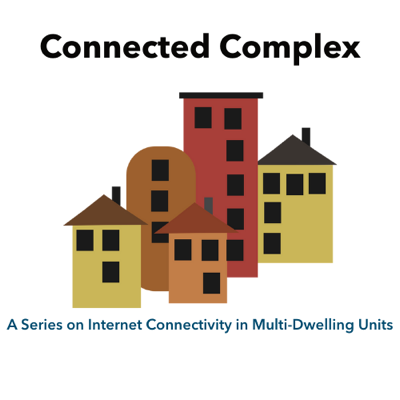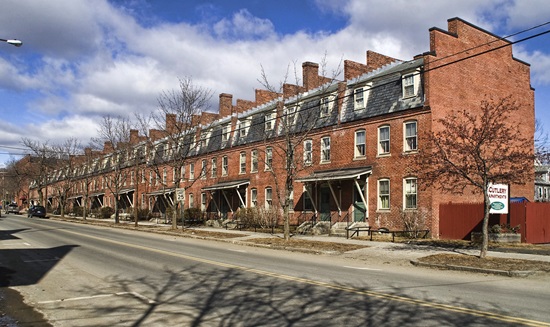
*This is the first installment of an ongoing series we are calling Connected Complex looks at how states, local communities, and Internet service providers are working to address the often complex challenges involved in bringing high-speed Internet access to multi-dwelling units.
Massachusetts state leaders have announced a new $31.5 million investment to bring reliable, high-speed Internet access to residents in affordable and public housing statewide.
A key part of the major new investment initiative focuses on something that’s particularly challenging in the northeast: updating long outdated wiring in multiple-dwelling-units (MDUs) like apartments, condos, and housing developments, many of which were built before the advent of the Internet.
The funds are being provided by the Massachusetts Broadband Office’s (MBO) Residential Retrofit Program, which aims to deploy state-of-the-art broadband infrastructure to public and affordable housing properties across Massachusetts. MBI’s funding, in turn, was largely made possible by the 2021 American Rescue Plan Act (ARPA).
In partnership with the Massachusetts Broadband Institute (MBI), Gov. Maura Healey’s office awarded the grant money to four Internet service providers: Aervivo, Archtop Fiber, Comcast, and Community Broadband Networks FLX (CBN-FLX). All told, the funding is poised to deliver broadband access to 13,700 housing units across 60 Massachusetts municipalities.

Archtop Fiber received $481,955 to deploy fiber and community-area Wi-Fi to 164 housing units. Comcast received $12.9 million to deliver coaxial-based broadband and community-area Wi-Fi to 5,179 units. Aervivo received $10.5 million to deliver hybrid wireless access to 6,402 units. And CBN-FLX received $7,606,664 to expand fiber and Wi-Fi to 1,514 housing units.
“With this funding, we’re making sure low-income residents have the same access to essential services, opportunities, and tools as everyone else, leading to a more connected and advanced economy,” said Ashley Stolba, Massachusetts Interim Economic Development Secretary.
The program prioritizes projects in federally designated Qualified Census Tracts and properties with high percentages of deed-restricted affordable housing. That includes a lot of housing development properties that have long struggled with access to modern connectivity.
“Public and affordable housing residents deserve the same level of connectivity as everyone else,” said MBI Director Michael Baldino. “This funding helps level the playing field and connects families to everything from telehealth to remote learning.”
The MBI did not respond to a request for comment providing details on the exact pricing being offered in developments by the winning bidders, or whether residents will get any sort of affordability discount for access.
The MDU Problem
For decades, one of the biggest obstacles to broadband expansion has been gaining consistent access to apartment, condo, and other multi-dwelling units (MDUs) to install modernized fiber or wireless technologies. It’s particularly an issue in lower-income, minority, and marginalized U.S. communities.
Many landlords are simply absentee, obstinate, or just generally difficult to coordinate with. Others have tried to charge broadband providers exorbitant fees simply to set foot in the building.
While some have struck anti-competitive arrangements with local regional telecom monopolies barring entry to other competitors, in some instances even to advertise.
A 2016 Wired story by Susan Crawford outlines the myriad ways that regional monopolies and landlords have often fought to create block-by-block de facto monopolies over access to an essential service. Monopolies that, more often than not, have the biggest harmful impact on low-income, minority, and other marginalized communities.
Federal lawmaker efforts to rein in these abuses have been, at best, inconsistent, if not outright dysfunctional.

In 2006, the FCC imposed rules attempting to ban such problematic partnerships, but they were so full of loopholes as to be useless. Then, after decades of complaints, the FCC finally tried to update the rules in 2022, but again leveraged such an inconsistent assortment of technological definitions and standards as to blunt any real-world benefit.
In 2024 the FCC again tried to revisit the problem with a focus on “bulk billing” arrangements, a practice that imposes a specific broadband service provider on tenants.
Such arrangements can be problematic if abused by giant monopolies to monopolize, but can be useful to help finance community-access to long neglected developments.
Broadband consumer groups have spent the better part of two decades illustrating the full scope of the problem, with little competent federal policy to show for it.
State By State Solutions
Like many states, Massachusetts is heavily dominated by regional telecom monopolies that see little regulatory or competitive incentive to compete on price, expansion, or customer service. Verizon and Comcast largely dominate the state, with years of widespread complaints by communities left on the wrong side of the digital divide.
In an era where the federal government is increasingly abdicating its responsibility to ensuring the equitable, affordable deployment of competitive broadband, states and municipalities are often being left to fill the void on policy. But state efforts to address the MDU competition and access problem have similarly been ineffective, piecemeal, or nonexistent.

Massachusetts is at least trying to address the issue through the Massachusetts Broadband Institute, a division of the Massachusetts Technology Collaborative. The state’s Residential Retrofit Program has an eight-step process to identify properties in need of access improvement, though the state did not respond to requests for progress updates.
States like Nevada and New York have similar programs, tethered to an historic round of federal broadband grants, attempting to address the MDU logjam, particularly with an eye on vulnerable populations.
Massachusetts’ program takes specific aim at properties where residents fall at or below 300 percent of Federal Poverty Guidelines for household size or income at or below 65 percent of Annual Median Income (AMI). But the program’s biggest latest winner, Comcast, has been a fairly central player in anti-competitive arrangements struck with landlords country-wide.
The MBI says it will also not invest in properties where less than 50 percent of the units are deed restricted affordable unless the property owner can provide sufficient information regarding the long-term affordability of the property and that residents meet U.S. Treasury definitions of “impacted” or “disproportionately impacted.”
Only in fairly recent years have policymakers even bothered to put affordability at the heart of the conversation, and hopefully MDU restrictions will be seeing an ever-greater focus in efforts to modernize America’s often-dilapidated infrastructure.
Header image of apartment building with old wiring courtesy of Pexels Public Domain
Inline clip art of apartment buildings courtesy of NeedPix.com Public Domain List
Inline of the Crocker Cutlery apartments in Turner Falls MA courtesy of Flickr user Liz West, Attribution 2.0 Generic







